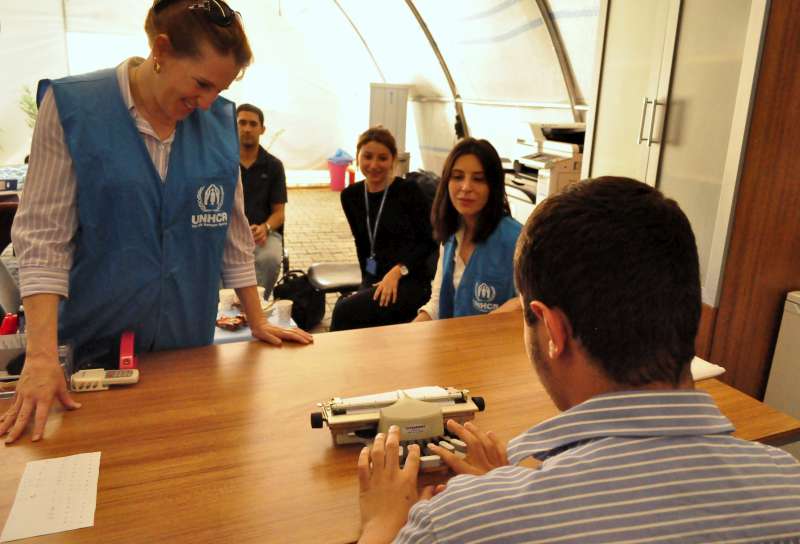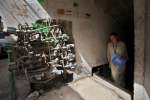Helping a blind boy to focus on his dreams in Turkey
Making a Difference, 4 August 2014
MIDYAT REFUGEE CAMP, Turkey, August 4 (UNHCR) – Ashraf says everyone wrenched from their home and forced to become a refugee, finds life a struggle: "When you come to a new country, it's as if everyone is blind."
Not everyone is as cheerful and resilient as the 15-year-old, forced to flee from Aleppo in northern Syria to Turkey with six other members of his family almost a year ago. In his case, blind is not just a metaphor: Ashraf and his brother are visually impaired.
That made their journey to Midyat and the subsequent adjustment to life in exile even harder for them than for other refugees.
Since arriving, Ashraf has been attending the school in Midyat refugee camp and recently completed Seventh Grade. Despite the absence of braille materials or specialized writing equipment for him, he was one of the top performers.
"I just listen in class and learn by listening and memorizing," he said. For exams, an older student or teacher reads the questions and he answers verbally. However, it's clear this transition to a camp school has not always been easy.
"I used to attend a school for the blind in Aleppo where we learnt to read braille. There I didn't feel different from everyone else," he said. "We even played football with a special ball that had bells so we knew where it was, but here I don't have anyone to play with."
Working closely with the Turkish government, the UN refugee agency has been supporting the Syrian refugees and providing material and technical support to help the authorities respond to the crisis and manage the increase in arrivals. UNHCR supports the government's registration programme to ensure that people with special needs are identified early and referred to the appropriate mechanisms.
Midyat is not a particularly large camp by Turkish standards, hosting some 2,800 refugees like Ashraf and his family. There are a total of 22 refugee camps with some 220,000 Syrian refugees in Turkey. Of the more than 1 million Syrian refugees estimated to be in the country, only 20 per cent are registered in camps. The rest live in cities.
Half of the refugees are children, some with special needs. The Ministry of Education has established schools in all of the refugee camps the government manages in south-eastern Turkey, enabling approximately 61,000 Syrian refugee children to attend schools staffed by volunteer Syrian teachers. UNHCR supports these efforts by providing educational support materials on request.
The agency recently purchased a braille writer – a typewriter used to produce braille documents – for the use of visually-impaired children and adults as part of the agency's support to education for Syrian refugee children.
"Although I learnt to read braille in Syria, I haven't had much chance to use a writer," Ashraf said shyly. But clearly access to the writer is expanding his skills; he excitedly showed UNHCR staff how he can now write phrases in both Arabic and Turkish letters.
The braille writer is an important tool for a visually-impaired teenager like Ashraf, but the refugees' education needs are huge, while resources are limited. The only braille material available in the camp for Ashraf to read is the Koran he brought from Syria.
That has not hampered his vision for the future. "I want to become a psychologist one day," said Ashraf. "I'm a good listener and I often help people find solutions to their problems."
Turkey hosts the second-largest Syrian refugee population in the region – after Lebanon – but has only received 17 per cent of the funding it needs. In total, UNHCR and its partners are calling on donors to fund a US$3.74 billion assistance programme across Lebanon, Jordan, Turkey, Iraq and Egypt to save lives, prevent harm, protect the vulnerable and strengthen the capacity and resilience of refugees and host communities as the crisis deepens into its fourth year.
By Jennifer Robert and Selin Unal in Midyat Refugee Camp, Turkey











































